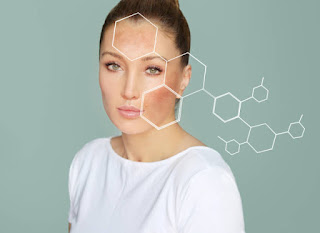Unlocking Radiant Skin: The Vital Vitamins for Glowing Skin, Hyperpigmentation, and Tyrosinase Regulation
Glowing skin is often considered a sign of good health and vitality. While genetics, skincare routines, and lifestyle factors play a significant role in achieving radiant skin, the role of vitamins should not be underestimated. Vitamins are essential organic compounds that our bodies require for various physiological functions, including maintaining healthy skin. Incorporating the right vitamins into your diet or skincare regimen can contribute to a radiant complexion. In this guide, we'll explore the key vitamins for glowing skin and their benefits, especially in addressing hyperpigmentation and regulating tyrosinase activity.
Vitamin A:
- Benefits: Vitamin A promotes skin cell turnover and collagen production, leading to smoother, firmer skin. It also helps combat acne and reduce the appearance of fine lines. Additionally, vitamin A can aid in the treatment of hyperpigmentation by regulating melanin production and inhibiting tyrosinase activity.
- Sources: Sweet potatoes, carrots, spinach, kale, and liver.
Vitamin C:
- Benefits: Vitamin C is a potent antioxidant that brightens skin, fades dark spots, and boosts collagen production. It also protects the skin from free radical damage, which can exacerbate hyperpigmentation.
- Sources: Citrus fruits, strawberries, kiwi, bell peppers, and broccoli.
Vitamin E:
- Benefits: Vitamin E acts as an antioxidant, protecting the skin from UV damage. It helps maintain skin's moisture and elasticity, reducing dryness and fine lines. Furthermore, it can assist in mitigating hyperpigmentation by preventing further oxidative damage.
- Sources: Nuts, seeds, spinach, broccoli, and avocado.
Vitamin D:
- Benefits: Vitamin D supports skin cell growth and repair. It may help treat skin conditions like psoriasis and can promote an overall healthy complexion. Adequate vitamin D levels are also associated with reduced risk of hyperpigmentation disorders.
- Sources: Sun exposure, fortified dairy products, and fatty fish like salmon.
Vitamin K:
- Benefits: Vitamin K plays a role in blood clotting and can help reduce the appearance of dark under-eye circles and bruises. It may also have a role in minimizing post-inflammatory hyperpigmentation.
- Sources: Leafy greens, broccoli, Brussels sprouts, and fish.
Vitamin B Complex (B3, B5, B6, B7, B12):
- Benefits: The B vitamins contribute to skin health by improving moisture retention, reducing inflammation, and promoting an even skin tone. Vitamin B3 (niacinamide) is particularly effective in addressing hyperpigmentation by inhibiting tyrosinase.
- Sources: Whole grains, meat, poultry, fish, dairy, nuts, and legumes.
Vitamin F (Essential Fatty Acids):
- Benefits: Essential fatty acids, including omega-3 and omega-6, maintain the skin's lipid barrier, preventing moisture loss and keeping the skin supple and soft. These fatty acids can also assist in reducing inflammation associated with hyperpigmentation.
- Sources: Fatty fish, flaxseeds, chia seeds, and walnuts.
Vitamin H (Biotin):
- Benefits: Biotin promotes healthy hair and nails, which can indirectly contribute to a more youthful appearance. It may also help improve skin conditions like dermatitis. While it doesn't directly impact hyperpigmentation, healthy skin overall can aid in its management.
- Sources: Eggs, nuts, sweet potatoes, and organ meats.
In conclusion, achieving glowing skin involves a holistic approach that includes a balanced diet rich in essential vitamins, along with a proper skincare routine and lifestyle choices like staying hydrated, getting adequate sleep, and protecting your skin from UV damage. While vitamins can enhance skin health, they also play a crucial role in managing hyperpigmentation and regulating tyrosinase activity. Consulting with a dermatologist for personalized guidance on addressing hyperpigmentation is advisable for more targeted results.




Comments
Post a Comment